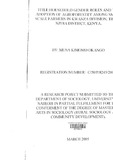| dc.contributor.author | Okango, Musa K | |
| dc.date.accessioned | 2013-05-07T09:32:01Z | |
| dc.date.available | 2013-05-07T09:32:01Z | |
| dc.date.issued | 2005 | |
| dc.identifier.uri | http://erepository.uonbi.ac.ke:8080/xmlui/handle/123456789/19706 | |
| dc.description | Master of Arts in Sociology (Rural Sociology and Community Development). | en |
| dc.description.abstract | Kenya is faced by the problem of degradation of forests, which in turn negatively affects
agricultural productivity. Agroforestry is one of the strategies that the government and
other stakeholders have used to.try and curb forest destruction in the country.
Agroforestry is encouraged especially among small-scale farmers because they make the
greater percentage of farmers and also. because they playa leading role in agricultural
production in the country. However in small-scale households, roles are organized
according to. sex, which tends to. impede the practice of agroforestry. This study critically
analyzes in what ways the organization of roles in the household according to. sex affect
the practice of agroforestry by focusing an the small scale households of Kwanza
Division in Trans-Nzoia District this study also. gives same recommendations an haw
farmers can be motivated to. adapt the practice of agroforestry. | en |
| dc.language.iso | en | en |
| dc.title | Household gender roles and the adoption of agroforestry among small scale farmers in Kwanza division,Trans-Nzoia district, Kenya. | en |
| dc.type | Thesis | en |
| local.publisher | Department of Sociology and Social work, University of Nairobi | en |

